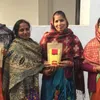How this agarbathi brand has been empowering rural women for seven decades
Cycle Pure Agarbathies, one of the pioneers in the country’s fragrance industry, has about 70 percent of manufacturing driven by women today.
Thirty-eight-year old Nandini Ranganath was forced to shift to Mysore from her village in Talakadu, Karnataka, for her daughter’s education. A BCom graduate, she aspired to support her family herself.
She thus partnered with Cycle Pure Agarbathies to set up her own business in agarbathi making. She started her business Nandini Unit with support from her husband in a rented place.
Under the company’s guidance, Nandini was able to shift back to her village in Talakadu after her daughter's education — where she had her own land and could manage a better workforce. The unit which started with just one machine, has 8 machines and 9 local women from her community running it now.
Today, she is one of the 1,500 women who are supported by Cycle Pure Agarbathies with their outsourcing initiatives. Since the 1950s, the agarbathi manufacturing company has been working with women from rural communities to produce incense sticks for them.

“We source raw materials and provide them to the rural women. Then we go back after a week and they would have completed the raw materials into finished products. We then collect the products, pay them their dues, and give them another batch of material to work with,” says Arjun M Ranga, Managing Director at Cycle Pure Agarbathies, in a conversation with SocialStory.
Nandini is one of several women who have found this initiative to be a lucrative source of income. Although she initially teamed up with Cycle Pure Agarbathies to assist at a unit, over time, she was happy to embrace technology, broaden her scope of work and skills, and finally hire more women to assist at the unit.
Changing job scenarios
Cottage industries are the norm in rural India, and working at these small scale industries not only empower rural women, but also their families. Cycle Pure, a flagship brand of the NR Group, recognised the opportunity presented by the cottage industry model in rural Karnataka and took to employing and upskilling women in the region.
The labour-intensive incense-making sector in the country is primarily dominated by rural women. “Men usually go out to work, while women are more housebound, catering to the children and household chores. Many women have free time on hand when they finish their chores and when the children go to school. We noticed this and started employing these women to provide them with a source of income as well,” Arjun says.

Arjun Ranga
He recalls how his grandfather and founder of Cycle Agarbathies, N Ranga Rao, decided to outsource it to rural women, thereby empowering them.
According to Arjun, incense sticks were and are still mostly handled by women due to their dexterity, as these fine products need to be handled delicately.
Today, close to 70 percent of the firm’s products are manufactured by women entrepreneurs from the comfort of their homes or nearby facilities set up by the company. As Cycle is headquartered in Mysore, many women from rural areas around the town are employed in incense-making. Over the years, the company has also provided employment opportunities to rural folks from Tamil Nadu, Maharashtra, Andhra Pradesh, Odisha, Punjab, Haryana and Uttar Pradesh.
Building entrepreneurs
Talking about how they operate, Arjun says, “We select a couple of capable women from the trained group of women to lead the others and they ensure the quality of the products. These women then become our suppliers.”

A woman involved in the packaging of agarbatti
While the sticks were initially handmade by women, since 2005-06, the process has been mechanised, with semi-automatic machines provided to the women in their homes. Today, only premium high quality incense sticks are handmade, and the task is given only to those women who have been at it for years.
Cycle has also been outsourcing the packaging of the incense sticks, with women prisoners being given the opportunity to earn something.
According to Arjun, women from over 25,000 families have been financially empowered by Cycle’s efforts till date. As a firm, it hopes to change the status of rural women in the Indian job market through its skill development initiatives.
Edited by Anju Narayanan


![[Sustainable Agenda] This initiative is making incense sticks out of flower waste](https://images.yourstory.com/cs/5/79900dd0d91311e8a16045a90309d734/MHDPfeat-1644412342864.jpg?fm=png&auto=format&h=100&w=100&crop=entropy&fit=crop)





